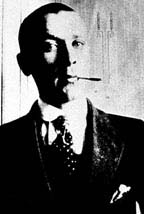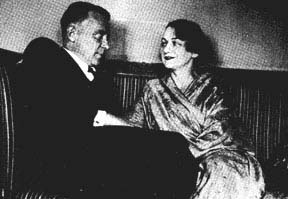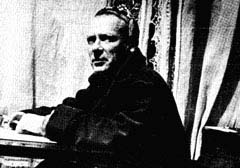Mikhail
Bulgakov
(1891-1940)

Mikhail Afanasievich Bulgakov was born in 1891 in Kiev, today the capital
of Ukraine. His father was a professor at the Theological Academy. After
finishing high school, Bulgakov entered the Medical School of Kiev
University, graduating in 1916. In 1913 he married Tatyana Lappa, who
moved with him after graduation to provincial villages, where he practiced
medicine. He wrote about his experiences as a doctor in his early works
"Notes on Cuffs" and "Notes of a Young Country
Doctor."
In
1918 Bulgakov returned to Kiev, which at the end of World War I and the
beginning of the Civil War in Russia was fought over between several
forces: the Germans, the Ukrainian Nationalists, the Red Army (Bolshevik),
and the White Army (Anti-Bolshevik). Bulgakov's brothers enlisted in the
White Army and fled with them, eventually landing in Paris. Bulgakov
enlisted as a field doctor with the White Army and ended up in the
Caucasus, where he gave up medicine and began working as a journalist. He
never left Russia, and was never granted a visa to visit his brothers.
In 1921, the Civil War over,
Bulgakov moved to Moscow and began to make his living as a writer. In
Moscow he divorced his first wife to marry
Liubov' Belozerskaia in 1924.
He wrote both humorous sketches and
novels, and his novel White Guard (1924) was one of the first serious
works to describe the Civil War (the book is a novelized version of
Bulgakov's own experiences in wartime Kiev). Bulgakov based his play, Days
of the Turbins, on White Guard, and it premiered at the Moscow Art Theater
in 1926. Supposedly it was one of Stalin's favorite plays. Bulgakov wrote
several other plays, becoming the preeminent Russian playwright of his
day, but the plays also earned him a hostile reception in the Soviet
press. As the Soviet Union became more ideologically rigid in the late
20s, Bulgakov's ambivalent works came under attack more and more often,
and all his plays were banned in 1929.
Bulgakov, left with no way to make a
living, did what many writers in a similar position did: he wrote a letter
to the government. In reply he received a telephone call from Stalin, who
offered to appoint him to the Moscow Art Theater. This was the period when
Bulgakov began work on the Master and Margarita.
Around this time he met and began
courting Elena ShilovskayaE
who may have become in part the model for Margarita. Bulgakov married Elena in 1932.
part the model for Margarita. Bulgakov married Elena in 1932.
Increasingly, Bulgakov worked on
adaptations and historical fiction, which can be less ideologically
dangerous than original works. For example, he adapted Gogol's Dead
Souls and Cervantes' Don Quixote for the Russian stage. He
wrote a biography of the French playwright Moliere. Bulgakov's play about
Moliere, The Cabal of Hypocrites, deals with the position of a
writer in an autocratic dictatorship. Rehearsed at the Moscow Art Theater
for 4 years, the play was banned after only 7 performances. Another play, Pushkin
(The Last Days), treats the same theme and suffered the same fate.
Again Bulgakov was in despair, and this time he moved to the Bolshoi Opera
as a librettist.
Bulgakov hoped to regain favor with the
government by writing a play in honor of Stalin's 60th Jubilee. The play, Batum,
was set in the Caucasus and portrayed Stalin's early years as an activist.
Bulgakov was on his way by train to begin rehearsals in Batum, when he was
called back by telegram to Moscow. The play was banned. This final blow
may have contributed to Bulgakov's ill health. He died in March of 1940.
